Negotiations in Dubai are entering their final days. Can countries deliver a deal that tackles fossil fuels and unlocks funding for climate-vulnerable nations?
Welcome to our live coverage of COP28. Keep up to date with the latest news from Dubai from the UN climate conference.
 ADVERTISEMENT
ADVERTISEMENT
 ADVERTISEMENT
ADVERTISEMENT

 ${title}
${title}
Live ended
That's all from us today, thank you for joining us. We'll be back tomorrow as negotiations ramp up towards a final deal but for now, here's a round-up of what happened today.
Food day got off to a flying start with the announcement that a “vanguard” of countries including Brazil and Norway are grouping together to transform their food and land use systems.
Established under the Paris Agreement in 2015, the global goal on adaptation (GGA) is a framework to help channel money for adaptation - and get it flowing on the same scale as finance for mitigation (which concerns supporting countries to cut emissions). After two years of work, a draft text on the GGA was published this morning, to a mixed reception from campaigners and experts.
The International Energy Agency warned that emissions-cutting pledges made by more than 100 countries and 50 fossil fuel firms at the start of COP28 aren't enough to limit global warming to 1.5°C. 2 December.
If these pledges are delivered it would reduce emissions by 4 billion metric tonnes of CO2 equivalents by 2030. That is 30 per cent of what is needed to limit warming to 1.5C above pre-industrial levels.
"They would not be nearly enough to move the world onto a path to reaching international climate targets," the IEA said.
And, as the finish line of the summit rapidly approaches, COP28 President Sultan Al Jaber said that he is urging countries to come to negotiations "prepared with solutions" and "ready to be flexible and accept compromise". The "time has come for us to switch gears", he said.
Al Jaber says "good progress" is being made but it isn't fast enough, warning countries that "failure or lack of progress or watering down my ambition is not an option".
Over 120 Brazilian organisations urge Lula to halt oil auction
More than 120 civil society organisations have signed an open letter to President Lula calling for him to stop the mega auction of new oil and gas blocks and take a stand against fossil fuel exploration in the Amazon and throughout Brazil.
Signatories include youth movements, Indigenous Peoples, environmental NGOs and Fridays for Future Brazil.
The letter - titled 'For a Brazil and Amazon Free of Oil and Gas!' comes after an oil auction was announced by the National Agency of Petroleum, Natural Gas, and Biofuels, aiming to allocate 602 new areas for oil and gas exploration.
"The announcement of the mega auction exposes Brazil's contradiction," says Diego Casaes, campaigns director at Avaaz - one of the groups that signed the letter.
"Our negotiators need to advocate for the immediate replacement of fossil fuels at this COP, and in Brazil, President Lula needs to halt this carbon bomb. The letter demonstrates that society is paying attention to Brazil's promises, and there is a long way to go if President Lula wants to be a true climate leader."
Global Goal on Adaptation missing 'crucial' elements
Some more reactions to the Global Goal on Adaptation announced earlier today.
Kiryssa Kasprzyk, director of international climate policy at Conservation International, says that the current proposed target for increasing the resilience of nature is "problematic".
"It lacks the level of ambition needed to be truly effective and it lacks the measurability that countries need to develop robust adaptation plans. Earlier drafts called for the conservation and protection of 30 per cent of ecosystems to bolster climate resilience. The current draft no longer has this call to action, which science shows is necessary to maintain biodiversity health and ecosystem services at a global scale."
Sandeep Chamling Rai, WWF senior advisor for global climate adaptation policy, also says the draft text is missing some "crucial elements".
“Vulnerable communities desperately need more finance to build resilience to the impacts of the climate crisis. However, the text only reiterates the longstanding call for developed countries to double adaptation finance without providing a clear roadmap to deliver it. The text is also missing concrete global targets. The current target is still vague and needs to be further strengthened to include key areas that need to see resilience boosted, such as oceans and mountains. It is also concerning to see the target to protect 30 per cent of land by 2030 now missing. Nature is an ally in limiting the impacts of the climate crisis and that must be recognised and acted on."
With some improvements, Chamling Rai adds, it could be a solid outcome.
A few pictures from around COP28 today.

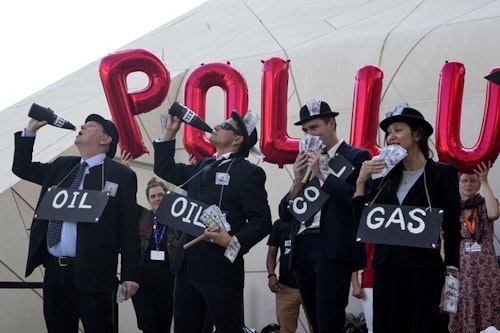
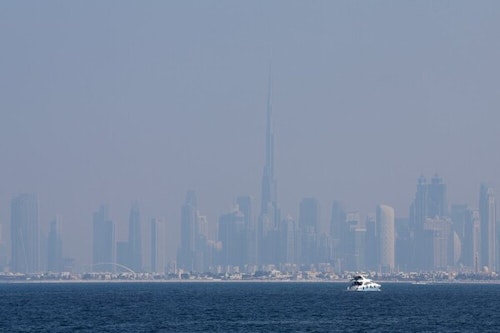
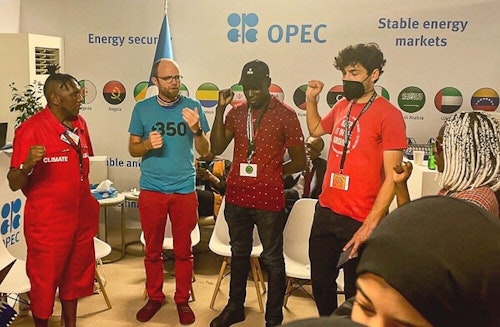
COP28 President Sultan Al Jaber has just told reporters in Dubai that he is urging countries to come to negotiations "prepared with solutions" and "ready to be flexible and accept compromise". He said that the "time has come for us to switch gears".
Though Al Jaber claims "good progress" is being made, he says it isn't fast enough. The COP28 president is calling for consensus on two main issues, funding for a just transition and fossil fuels, saying "We need text agreed by everyone on greenhouse gases".
"I want them to know failure or lack of progress or watering down my ambition is not an option," Al Jaber added.
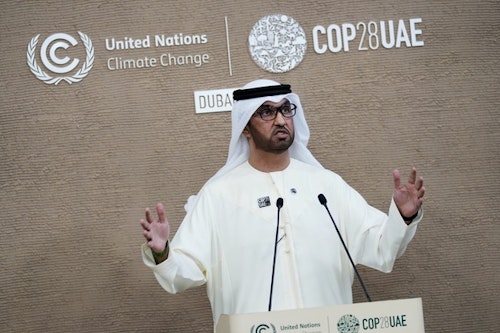
A few more reactions on the UN's climate roadmap for food and agriculture which was set out earlier today.
ActionAid International has said that the roadmap fails to target agricultural emissions:
"The Roadmap’s big problem is that it can’t bring itself to name the real issues at stake. It dances around the elephant in the room, pointing the finger anywhere but the actual culprits in the food sector. In failing to name chemical fertilisers, factory farming or industrialised agriculture as the major sources of emissions and deforestation, its recommendations boil down to protecting the status quo."
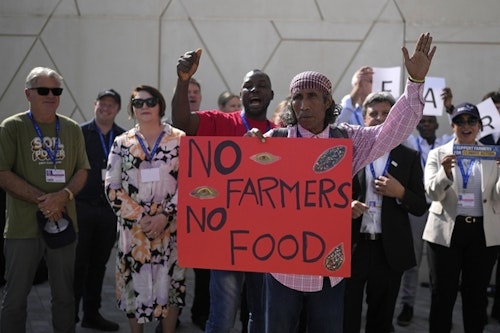
Ruth Davis, a fellow at the European Climate Foundation and senior associate at Smith School of Enterprise and Environment in Oxford says it's a good start but could go further:
"The world desperately needs a roadmap which points us to a fairer, more resilient and sustainable future for food systems. The FAO has made a useful start but it doesn't take us all the way to the destination we need. The roadmap's milestones mean that companies and governments now have no excuse for ignoring food in their climate plans. But there are vital missing elements, including a much stronger focus on nature, which the FAO’s own scientists acknowledge is crucial to ensuring food security."
'Abated' fossil fuels would still be devastating for human health, Global Climate and Health Alliance warns
Watering down the final text by committing to phase out 'unabated' fossil fuels could be devastating for human health, the Global Climate and Health Alliance (GCHA) - a network of more than 160 health professional and civil society groups - has warned.
“The difference for people’s health of phasing out only ‘unabated’ fossil fuels, versus a full fossil fuel phase out is night and day”, says Dr Jeni Miller, executive director of GCHA.
“Important questions remain about whether carbon capture and storage can work at scale. But even setting that aside, CCS (carbon capture and storage), and similarly, focusing on reducing emissions rather than the fossil fuel sources of emissions, does nothing about the many other pollutants produced when fossil fuels are burned, and that are devastating to human health.”
Dr Miller adds that currently, 99 per cent of the world's population breathes unhealthy air with 5 million people each year dying prematurely due to air pollution. While CCS, as the name suggests, captures carbon emissions it doesn't address small particulate pollution which drives respiratory diseases, cardiovascular diseases (like strokes) and damage to children's lungs.
“COP28’s only sane pathway - one that will protect people's health - is an agreement that sets in motion the orderly and just phase out of all fossil fuels”, says Dr Miller.
“Reducing ‘unabated’ fossil fuel use in return for as yet unproven, undeveloped and barely existing carbon capture technologies is not a credible solution."
Activists have disrupted an Organisation of the Petroleum Exporting Countries (OPEC) youth event at COP28 today.
"We know that the chair of the OPEC has sent a letter a couple of days ago asking its members to push back on fossil fuel language. We think it's a very bad sign," Nicolas Haeringer from NGO 350.org told the crowd.
🚨Breaking🚨: Alongside other climate activists we just disrupted the Organization of the Petroleum Exporting Countries (OPEC) at their youth event at #COP28.
Fossil fuel lobbyists out of COP. ✊We need a fast, fair and funded phaseout of ALL fossil fuels, now! pic.twitter.com/5733IjUR5y
— 350 dot org (@350) December 10, 2023
"To us, having an OPEC pavilion here in the negotiations is like having a giant oil drill in the negotiations."
The activists chanted "What do we want? Phaseout. When do we want it? Now" before leaving the event.
COP28 fossil fuel pledges won't limit global warming to 1.5°C, IEA says
Emissions-cutting pledges made by more than 100 countries and 50 fossil fuel firms at the start of COP28 aren't enough to limit global warming to 1.5°C, the International Energy Agency (IEA) said on Sunday.
The IEA looked at two voluntary commitments made on 2 December:
- 130 countries agreeing to triple renewable energy and improve energy efficiency by 2030
- 52 oil and gas companies pledging to stop flaring and eliminate almost all methane leaks by 2030
If these pledges are delivered it would reduce emissions by 4 billion metric tonnes of CO2 equivalents by 2030. That is 30 per cent of what is needed to limit warming to 1.5C above pre-industrial levels.
"They would not be nearly enough to move the world onto a path to reaching international climate targets," the IEA said.
When we think of green jobs, we usually associate them with direct climate actions - like installing renewable energy or ensuring water quality.
“The interesting thing about green skills, though, is that they are they're actually much more broadly distributed than you might consider,” co-founder of LinkedIn Allen Blue told Euronews Green on the sidelines of COP28.
It isn’t just those that are obvious, he says, most jobs are likely to include the need for some green skills in the near future.
"But the issue is that the number of people with green skills remains about one in eight and one in nine in Europe.”
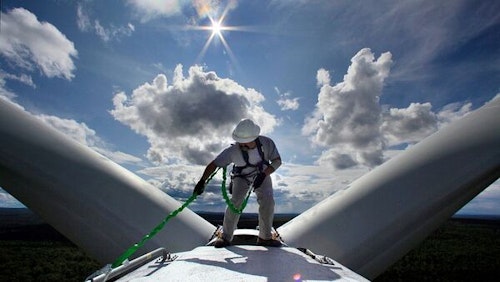
There are more green jobs than people with the skills to do them
We spoke to LinkedIn co-founder Allen Blue on the sidelines of COP28 to find out how to prepare the world’s workforce for a green future.UN chief urges leaders to agree on 'deep cuts' to emissions
UN Secretary-General Antonio Guterres has urged leaders at COP28 to agree on deep cuts to emissions to keep global warming below 1.5C.
We need far more ambition to reduce greenhouse gas emissions, and ensure climate justice," Guterres said, speaking at the Doha Forum conference.
"Despite promises and pledges, our climate is in breakdown. Emissions are at an all-time high. And fossil fuels are a major cause."
"I urge fossil fuel companies to use their enormous resources to lead the renewables revolution.
"And I urge leaders at COP28 in Dubai to agree on deep cuts to emissions, in line with the 1.5- degree."
"This is the only road not only to climate sustainability, but economic sustainability."
Negotiations are reaching crunch time as we approach the end of COP28. President of the UN climate conference, Sultan Al Jaber, is keen to wrap things up by Tuesday, saying at a plenary session late yesterday that "now is the time to shift gears and get to consensus."
So where do we stand on the key issue of phasing out fossil fuels?
Negotiations are still being held up by several different language options about 'phasing out'. Vanuatu's climate change minister told AFP today that there are "small minority of countries blocking progress".
EU climate chief Wopke Hoekstra heavily criticised the Organisation of the Petroleum Exporting Countries (OPEC) on Saturday after a letter from the group reportedly urged countries to reject a deal targeting fossil fuels.
"By many, including by me, that has been seen as out of whack, as unhelpful, as not in tune with where the world stands in terms of the very dramatic situation of our climate," Hoekstra said.
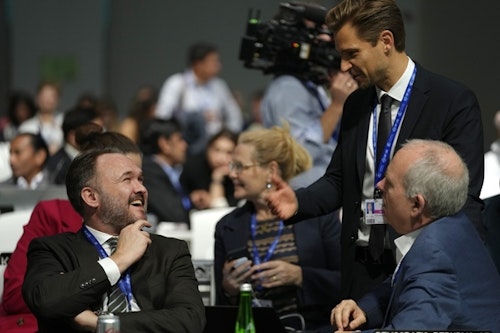
One-half of the environment minister pairing tasked with figuring out how to reach a consensus, Denmark's Dan Jorgensen, has urged nations to "start focusing on key priorities and show flexibility so that we can start to ... eliminate options".
China's top climate diplomat said late yesterday that a final agreement on fossil fuels at COP28 was crucial - even if it wasn't perfect. Chinese climate envoy, Xie Zhenhua, told reporters that without a fossil fuel agreement, there wasn't much chance of success at the UN climate summit.
How are vulnerable countries being helped to adapt to climate change? New draft text released
There are a few key pieces to the final COP28 deal that will (hopefully) emerge early next week.
One of these is adaptation, which means building resilience to the increasing impacts of the climate crisis. Funding for developing countries’ adaptation needs has been falling dangerously short for years, as a UN report warned earlier this year.
Established under the Paris Agreement in 2015, the global goal on adaptation (GGA) is a framework to help channel money for adaptation - and get it flowing on the same scale as finance for mitigation (which concerns supporting countries to cut emissions). But it’s been vaguely defined so far, and COP28 is meant to be the culmination of two-years' work to change that.
A draft text on the GGA was published this morning, to a mixed reception from campaigners on this critical issue.
My reaction to the NEW GGA Text:
"As we approach the conclusion of these intense climate negotiations, we hope that the new text on the Global Goal on Adaptation will lay the groundwork for ambitious targets and a meaningful decision. The document acknowledges the significant… pic.twitter.com/A9RQMNeFeY
— Harjeet Singh (@harjeet11) December 10, 2023
Here's what WaterAid - one of the world's biggest NGOs dealing with water and sanitation issues - is calling for at COP28.
Today is Water Day at COP28 💦
👇 Swipe to read about the three things we want to see to ensure people can cope with the devastating impacts of climate change.#COP28 #ClimateChange #CleanWater pic.twitter.com/7c7eX62I5W
— WaterAid Global (@wateraid) December 10, 2023
Brazil, Cambodia and Norway among countries leading the way on food systems
Food day has got off to a flying start with the announcement that a “vanguard” of countries are grouping together to transform their food and land use systems.
Brazil, Cambodia, Norway, Rwanda and Sierra Leone are part of this ‘high ambition coalition’ on food which signs them up to defined goals on climate adaptation, cutting emissions, livelihoods and equity, nature and biodiversity, according to a statement. The alliance hopes its whole systems approach to food will become a blueprint for other countries to follow.
Edward Davey from the Food and Land Use Coalition and World Resources Institute Europe comments:
The world has long needed champions to transform the way they produce and consume food amidst the climate crisis. That’s exactly why this Alliance is so important - these countries will show us what transformation can look like, and the rest of the world will benefit from their leadership. Along with the Emirates Declaration, these efforts finally put food in the spotlight in the climate fight, right alongside fossil fuels.
The UN’s Food and Agriculture (FAO) is also releasing a long-awaited report today, showing - for the first time in detail - how we can feed the world and radically cut global greenhouse gases, given food production is a major source of emissions.
Good morning! We’re into double digits at the COP28 climate conference, with final negotiations beginning tomorrow.
The theme for day 10 is food, agriculture and water. There’s already been some progress at COP on this front, with a new Emirates Declaration on Sustainable Agriculture, Resilient Food Systems and Climate Action launched last week. Signed by over 130 countries, it asks them to integrate food systems into national climate plans (known as “nationally determined contributions” or NDCs) before COP30 in Brazil.
Yesterday we learnt that Azerbaijan has been confirmed as next year’s COP host - a controversial move given the Eastern European country’s oil reliance.
And thousands of campaigners inside the inner blue zone marched for climate justice and called for a ceasefire in Gaza. Take a look back at other key developments from day 9:










